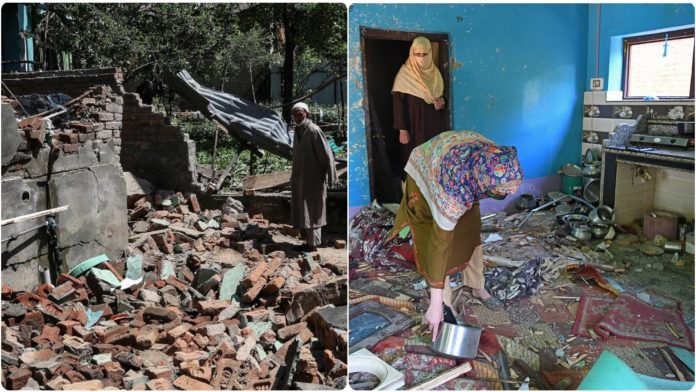In a sweeping crackdown following the devastating Pahalgam attack that claimed at least 28 lives, authorities in South Kashmir have demolished the homes of seven families across Pulwama, Shopian, Kulgam, and Anantnag districts. The demolitions, carried out over the nights of April 24 and 25, have sparked serious outrage and legal concerns, especially given the Supreme Court’s recent ruling against punitive demolitions without due process.
Officials, speaking informally to the media, claimed that the demolished houses belonged to members of the Lashkar-e-Taiba group, allegedly involved in the Pahalgam attack. Among those targeted were Ahsan Ul Haq Sheikh and Haris Ahmad from Pulwama; Zakir Ahmad Ganie and Zahid Ahmed from Kulgam; Shahid Ahmad Kutay from Shopian; and Asif Ahmad Sheikh and Adil Thoker from Tral and Bijbehara respectively.
In Pulwama’s Muran area, the house of Ahsan ul Haq Sheikh was razed, while in Shopian’s Chotipora, the residence of top Lashkar commander Shahid Ahmad Kuttay was demolished. In Kulgam’s Matalhama village, the house of Zakir Ahmad Ganie, active since 2023, was also brought down. Other demolitions followed in Tral and Bijbehara.
This brings the number of demolished residences linked to alleged militants to at least seven. Additionally, earlier in the week, houses in Bijbehara and Tral were damaged when explosives, reportedly found during search operations, detonated during security operations. The occupants and nearby residents were evacuated to safety before the explosions.
Families caught in the crossfire, however, are voicing anguish and anger. Yasmeena, sister of one of the accused, Asif Ahmad Sheikh, told The Wire, “When I reached, my mother and sisters had been taken away by police. During the night, I saw a man in camouflage who had perhaps come to plant a bomb. We have no idea about the attack in Pahalgam. This house was built by our grandfather. We had a share of only two rooms in it, but they destroyed the entire house.”
Breaking down in tears, she questioned, “Even if my brother was involved, what fault is ours? Why are our elderly parents and innocent family members being punished?”
The demolitions raise serious constitutional concerns, as the Supreme Court had earlier made it clear that demolitions without prior notice and opportunity to respond violate fundamental rights, particularly the right to shelter which is considered part of the Constitution’s basic structure.
Despite the legal restrictions, authorities have remained tight-lipped, issuing no official public statements regarding the operations. Communication has been limited to anonymous briefings to select media outlets, bypassing due accountability.
The events have fueled fresh debates on collective punishment, human rights violations, and the erosion of rule of law in conflict-torn Kashmir, with many questioning whether entire families should suffer for the alleged actions of individuals.




